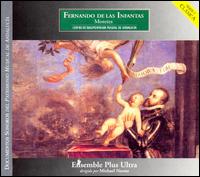Infantas, Fernando de las - Ave Maria
 for 5vv. a cappella
for 5vv. a cappella
 | Composer: Fernando de Las Infantas (1534-1610) Aliases, aka: Country of origin / activity: Spain / Italy | |
| Text author: traditional | ||
| Arranger / Editor: N/A |
Available documentation:
Score:| not available | . |
| My thanks and appreciation to ... for sending me this score. | |
Lyrics: (source)
Ave Maria gratia plena, | Sancta Maria, regina coeli, dulcis et pia, O mater Dei, ora pro nobis peccatoribus, ut cum electis te videamus. |
| MIDI: not available | MP3: not available |
| Recording: |
 | CD: Fernando de Los Infantes - Ensemble plus ultra Ave Maria a 5vv |
Video - posted on YouTube:
Uploaded on Feb 21, 2011 Fernando de las Infantas (Córdoba, 1534-1610) Ave Maria (5vv) |
Internet references, biography information:
| http://en.wikipedia.org/wiki/Fernando_de_las_Infantas |
From Wikipedia, the free encyclopedia From 1572–1597 Infantas resided in Rome, voluntarily giving his services to a hospital for the poor. In 1577 Infantas came into conflict with Pope Gregory XIII and the composers Palestrina and Annibale Zoilo over the reversal of reforms in Gregorian chant, at one point causing his sponsor Philip II of Spain to instruct the Spanish ambassador in Spain to intercede with the Pope. In 1584 Infantas took holy orders and served a small church on Rome's outskirts. He had returned to Spain by 1608 and presumably died around 1610.[1] Theological controversies Infantas' theological views may have influenced his preference, aside from the then standard Marian motets, for predominantly Biblical text settings in his publications. This is most notable in two almost unique settings of the Symbolum Apostolorum, a Credo according to the Apostles' Creed, not according to the ordinary of the mass. Infantas left no conventional mass setting. Michael Noone[3] suggests that, although it is possible that Infantas may have been aware of a setting by the French composer Jean Le Brung printed in 1540, it is equally likely that Infantas believed his settings to be unique. A third setting was visibly absent from the Pater Noster sequence in Book III, possibly as a result of criticism. |
| https://archive.org/details/donfernandodelas01mitj |
Don Fernando de Las Infantas, teólogo y músico. Estudio crítico biobibliográfico (1918) Author: Mitjana, Rafael, 1869-1921 |
 avemariasongs
avemariasongs org
org